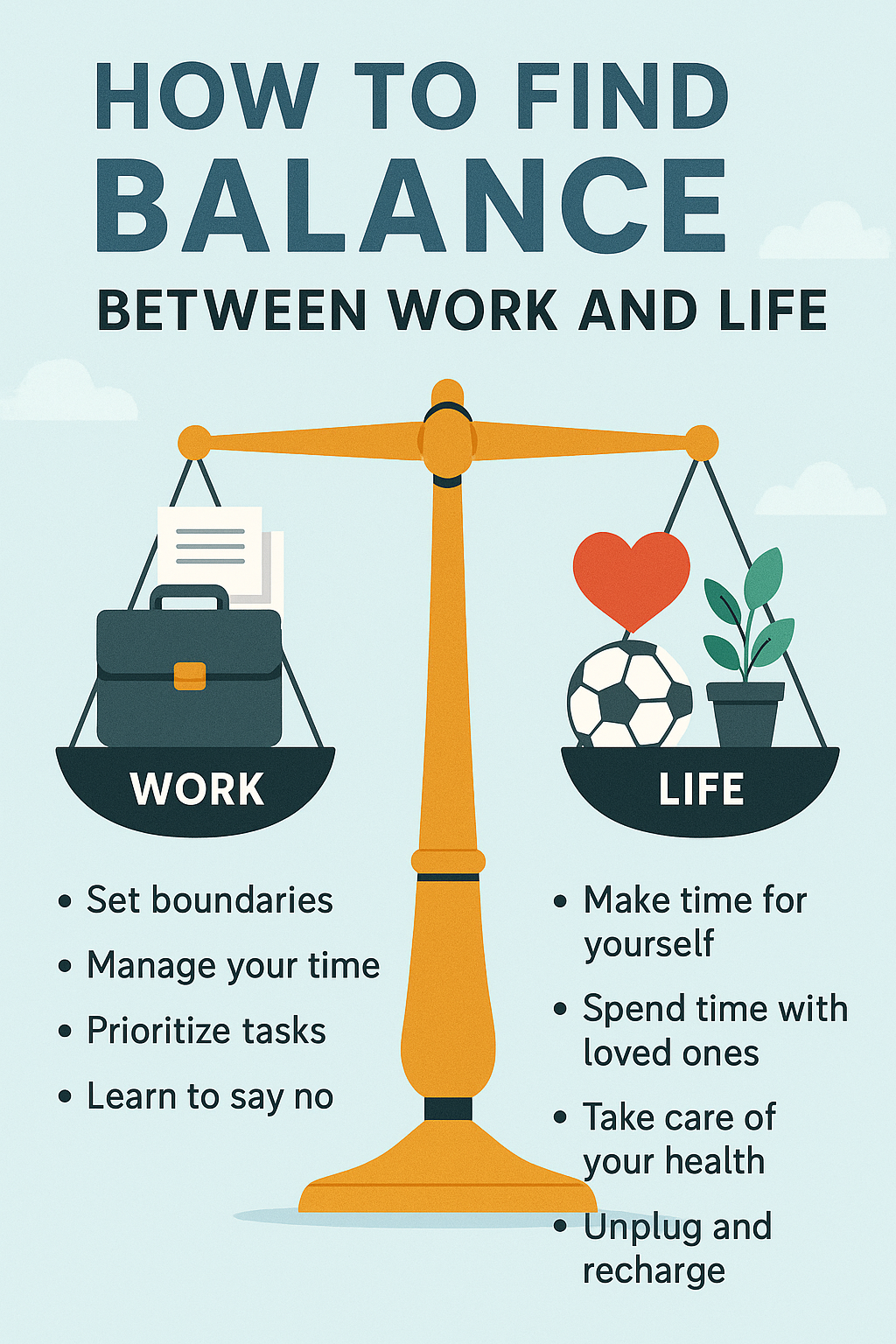In today’s fast-paced world, finding a healthy balance between work and personal life can be challenging. With the demands of modern work environments, technology, and various personal commitments, it’s easy to feel overwhelmed and stretched thin. However, achieving balance is crucial for your overall well-being and long-term success. In this article, we’ll explore practical strategies to help you find a balance that works for both your career and personal life.
1. Set Clear Boundaries
One of the key elements of work-life balance is setting clear boundaries between your professional and personal life. Without boundaries, it’s easy to let work seep into your personal time, leading to burnout and stress. By setting boundaries, you can ensure that you’re giving both your work and personal life the attention they deserve.
Tip: Set a specific work schedule and stick to it. Communicate these boundaries to colleagues and family members so that everyone respects your time.
2. Prioritize Your Time
In order to achieve balance, it’s essential to prioritize your time effectively. Understand what tasks are most important in both your personal and professional life, and allocate time accordingly. By focusing on high-priority tasks, you ensure that you’re making progress toward your goals while also giving yourself time to relax and enjoy life.
Tip: Use a time management technique, like the Eisenhower Matrix, to prioritize your tasks based on importance and urgency. This will help you stay focused on what matters most.
3. Delegate Tasks When Possible
You don’t have to do everything yourself. Delegating tasks at work and at home helps you reduce your workload and free up time for yourself. By delegating, you allow others to contribute and lighten your load, which helps you maintain balance and avoid feeling overwhelmed.
Tip: At work, delegate tasks to colleagues when appropriate. At home, share responsibilities with family members or consider outsourcing certain tasks (e.g., cleaning, grocery shopping) to create more time for yourself.
4. Make Time for Yourself
Taking care of yourself is essential for maintaining a healthy work-life balance. When you prioritize self-care, you’re better equipped to handle work-related stress and be present in your personal life. Whether it’s through exercise, hobbies, or relaxation, make time for activities that recharge and rejuvenate you.
Tip: Schedule “me time” in your calendar, just as you would for work meetings. Engage in activities that you enjoy, such as reading, exercising, or spending time with loved ones.
5. Learn to Say No
One of the biggest challenges to work-life balance is over-committing yourself. Whether it’s at work or in your personal life, learning to say no is crucial for maintaining boundaries and preventing burnout. By being selective about what you take on, you can ensure that you have the time and energy for the things that matter most.
Tip: Practice saying no in a polite but firm manner. When you feel your plate is full, politely decline additional responsibilities and focus on what is truly important.
6. Use Technology to Your Advantage
While technology can sometimes feel like a source of distraction, it can also help you manage your time and responsibilities more efficiently. Use productivity apps, scheduling tools, and task management software to stay organized and streamline your tasks.
Tip: Use apps like Google Calendar, Trello, or Todoist to keep track of work and personal commitments. Set reminders for important tasks and use technology to automate repetitive tasks whenever possible.
7. Set Realistic Expectations
Achieving work-life balance doesn’t mean you have to be perfect at everything. Setting realistic expectations for yourself helps you avoid unnecessary stress and feel more accomplished. Recognize that you may not always be able to meet every expectation, and that’s okay.
Tip: Be realistic about what you can accomplish in a day. Understand that it’s okay to leave some tasks unfinished or to adjust your schedule if unexpected events arise.
8. Take Breaks and Recharge
Taking regular breaks throughout your workday is essential for maintaining productivity and avoiding burnout. Step away from your desk, take a walk, stretch, or engage in a brief relaxation exercise. Breaks allow you to clear your mind and return to work with renewed energy and focus.
Tip: Use the Pomodoro Technique or another time management method to ensure that you take breaks throughout the day. Short, regular breaks can improve your focus and reduce stress.
9. Set Goals for Both Work and Life
Setting goals for both your professional and personal life helps you stay motivated and focused on what matters. Having clear goals allows you to track your progress and ensure that you’re dedicating time to both work and personal growth.
Tip: Create SMART goals (Specific, Measurable, Achievable, Relevant, Time-bound) for both your career and personal life. Regularly review and adjust your goals to maintain balance and stay on track.
10. Be Flexible and Adapt
Finding balance is an ongoing process that may require adjustments as your life and work circumstances change. Flexibility is essential to maintaining a healthy balance. Life is unpredictable, and being able to adapt to new situations helps you manage stress and stay productive.
Tip: Regularly assess your work-life balance and make adjustments as needed. Be open to trying new strategies and approaches to find what works best for you.
